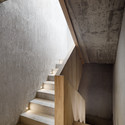
-
Architects: Luca Nichetto
- Year: 2013
-
Photographs:Jonathan Leijonhufvud

Text description provided by the architects. If one had to describe the relationship between Venetian designer Luca Nichetto and the Tales enterprise in only one word, it would be “emotion.” What brought these two lovers of design together is nothing short of a cocktail of right timing, trust, a twist of luck, and the mutual notion that emotion is at the core of design.

The Tales Pavilion came into being through a creative process inclusive of both design and enterprise. Nichetto developed the façade of the pavilion by converting 1,200 pieces of brass tubes into “grass leaves” that camouflage the entire structure. The “brass leaves” oxidize and change color naturally with the passing of the seasons, merging with the natural scenery of the Beijing Lido Garden and giving a sense of life to the pavilion. The architectural design is Nichetto’s depiction of the young and avant-garde Tales, which, much like grass, is free, natural, and full of life with a grand desire of growing.

For the interior design, Nichetto divided the pavilion into 6 impeccably delineated volumes, using different materials and colors to accentuate the outlines.

Organized across multiple gradients of light, all these areas create a sense of micro-urbanity, encouraging interaction between visitors and lovers of design alike. World renowned brands Foscarini, Diesel with Foscarini, Ibride, Petite Friture, Diamantini & Domeniconi and Seletti, will give life to the exhibitions and inner corridors of the pavilion with their story-telling design projects.

The goal of the Tales Pavilion is to establish itself as a design stage of international significance. The pavilion will become a dynamic and vibrant new complex for excellence in design. Tales’ philosophy of “story-telling design,” in unison with its acute attention in selecting collaborators and brands, perfectly suited Nichetto’s innovative approach to design and vice versa. In the words of Tales Co-founder and Creative Director, Terence Yeung, “It all came down to a matter of trust and good feeling,” how it all came to be was “like a natural connection.”

































